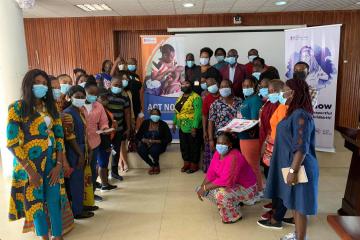N’Djamena – Ministers of Health of Cameroon, the Central African Republic and Chad have pledged to scale up efforts to eradicate Guinea-worm disease by 2030 in line with the road map to end neglected tropical diseases by the end of the decade.
Meeting on 17 September 2024 at an international high-level meeting to advocate and mobilize resources for the eradication of Guinea-worm disease, the ministers signed the N’Djamena Declaration on interrupting the transmission of Guinea-worm disease or dracunculiasis in the subregion. The N’Djamena meeting was organized by the Government of Chad, in collaboration with World Health Organization (WHO) and The Carter Center.
The meeting highlighted the need to scale up community-based surveillance, while maintaining and increasing domestic funding for national programmes to stop transmission. The discussions also identified the need to strengthen advocacy for access to drinking water and for implementing legal and regulatory measures to control dog and cat populations with a view to halting the spread of Guinea-worm disease and rabies within communities. The final point focused on strengthening synchronized cross-border interventions in endemic districts.
“The holding of this international meeting in N’Djamena takes on special significance, as only five countries in the world are currently endemic to this disease, including our own,” said H.E Allah-Maye Halina Mahamat, the Prime Minister of Chad. “As a signatory to the Abu Dhabi Declaration in March 2022 in the United Arab Emirates, Chad is committed to strengthening its leadership with a view to improving the health and well-being of its people. That commitment has been given tangible expression. In line with its steadfast commitment, Chad will continue to strengthen its strategies and actions to combat Guinea-worm disease.”
Chad accounts for over 50% of human cases of infection with Guinea-worm disease, and over 80% of animal infections recorded worldwide each year. The global incidence of the disease has dropped steeply, from around 3.5 million cases in the 1980s to just 14 in 2023, including nine in Chad. The human cases reported by Cameroon and the Central African Republic in 2019 and 2022 respectively are strongly suspected of having been imported from Chad, given the population movements on both sides of the border.
“Just as the people of Chad no longer face the threat of African trypanosomiasis, so today we stand on the threshold of freeing Chad – and the world – from Guinea-worm disease,” said Dr Tedros Adhanom Ghebreyesus, WHO Director-General. “This achievement is not just about numbers; it is about lives transformed and communities empowered.”
Significant progress has been made to eradicate Guinea worm in the African region with over 99 % reduction in cases from 843 640 when the eradication campaign was launched in 1989, to just 14 cases in 2023. Forty-two countries have been certified as having eradicated the disease; five remain to be certified (Angola, Chad, Ethiopia, Mali and South Sudan). The last mile to eradication faces huge challenges such as animal transmission creating spill-over infections to humans, inadequate safe water supply, dwindling funding, insecurity, cross border population movements, and climate change impacting water river basins.
“I encourage Governments to prioritize Guinea-worm disease surveillance across borders, integrate its eradication interventions into other disease control interventions and expand financing network through domestic resource mobilization,” said Dr Matshidiso Moeti, WHO Regional Director for Africa, congratulating Chad on its progress towards the elimination of neglected tropical diseases, notably the elimination of human African trypanosomiasis as a public health problem by 2024.
WHO recommends maintaining active dracunculiasis surveillance for at least 3 consecutive years in countries and/or areas that have recently interrupted transmission. Such surveillance is essential to ensure that no human or animal cases of the disease go undetected, and to prevent any recurrence.
The Organization advocates for eradication, provides technical guidance, coordinates eradication activities, ensures the implementation of surveillance in dracunculiasis-free areas, monitors the situation and tracks progress.
Note: This article have been indexed to our site. We do not claim legitimacy, ownership or copyright of any of the content above. To see the article at original source Click Here













